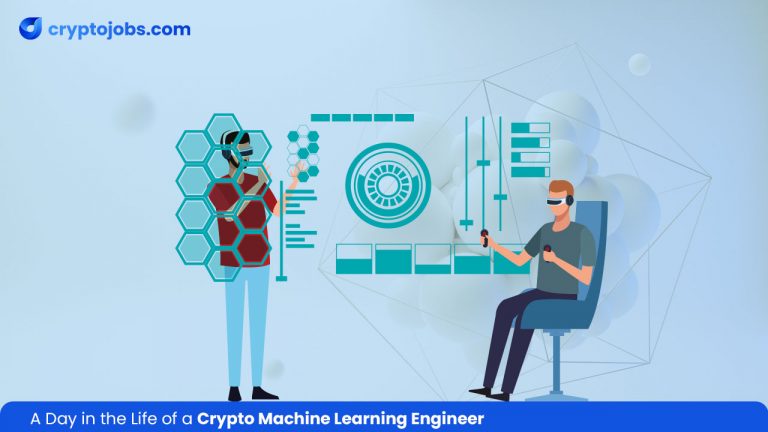
A Day in the Life of a Crypto Machine Learning Engineer
- cryptojobs.com
- August 1, 2024
- All Posts, Career Guide
- 0 Comments
Crypto machine learning engineers are at the front of technological innovation, bridging the gap between decentralized technologies and artificial intelligence. These experts play an essential role in developing autonomously learning and adapting systems that will change how we use digital platforms and services.
In the Web3 industry, machine learning engineers integrate advanced data science methodologies with software engineering experience. Their duties include creating algorithms that improve user experiences as well as automating and using predictive analytics to maximize operational efficiencies.
This article explores a machine learning engineer’s day-to-day life to help you understand whether this profession is for you or not.
Are you a talented professional looking to find your dream machine learning job in the Web3 industry? Look no further; register with cryptojobs.com today to find the most sought-after opportunities.
What is Machine Learning (ML)?
A branch of artificial intelligence, machine learning (ML), includes teaching computers to learn from data and gradually enhance their performance without the need for explicit programming. This dynamic sector is at the forefront of technological progress, allowing systems to solve complicated problems with growing autonomy and precision, discern patterns, and make judgments.
Daily Tasks of Crypto Machine Learning Engineers
Machine learning engineers have multiple main responsibilities that they take care of on a day-to-day basis. They have to analyze the company’s business objectives and develop models based on those objectives. The crypto machine learning engineer will compare data distribution systems and find their differences. They will also have to create validation strategies, manage data and hardware resources, verify data quality, and supervise the data acquisition process.
The Career Path of a Machine Learning Engineer
Typically, if you want to build a career as a machine learning engineer, you will first have to secure a position as an intern. Your first job will usually entail working on projects that provide you with basic knowledge and understanding of the organization’s technological goals. The typical tasks might include creating tools to increase access to vital data, such as Spark application logs, or streamlining procedures.
These tasks act as building blocks, offering hands-on exposure to data processing and software engineering methodologies. As time goes on, interns frequently move into more specialized positions in machine learning engineering, using the skills they have learned to take on increasingly difficult problems and support cutting-edge initiatives in the industry.
A Look into a Typical Day for a Crypto Machine Learning Engineer
A machine learning engineer’s usual workday starts with reviewing ongoing projects and existing code to ensure they are operating efficiently in comparison to predetermined benchmarks. This entails debugging and adjusting code.
They work on coding tasks, database design, and new concept development all day long to support forthcoming projects and improve the functioning of current ones. Writing unit tests and testing machine learning models are essential components of their everyday tasks.
Apart from their technical responsibilities, machine learning engineers take part in stakeholder meetings with clients and management to share project updates, request feedback, and suggest new ideas for product development.
Due to the crucial nature of their jobs, machine learning engineers frequently respond to urgent code requests or debug issues that emerge outside of usual office hours.
Skills Required to Become a Machine Learning Engineer
Hard Skills
- Ability to use statistical techniques and comprehend concepts such as Markov Decision Processes and Bayesian Networks.
- The capacity to plan and execute scalable software systems while taking engineering and architectural principles into account.
- Knowledge of a wide range of machine learning frameworks and methods, including Scikit-Learn, PyTorch, and TensorFlow.
- Fundamental knowledge of data structures, computer architecture, and algorithmic complexity are prerequisites for understanding data structures and algorithms.
Soft Skills
- Strong written and spoken communication skills to explain difficult ideas to a variety of audiences.
- Paying close attention to detail is a methodical technique that guarantees precision and dependability while analyzing data and implementing models.
- The capacity to apply original problem-solving ideas and to innovate algorithm development and system optimization.
Advanced Skills (Senior Positions)
- The ability to use the latest tools to automate the deployment and administration of infrastructure.
- Design and optimize machine learning algorithms and systems with Python, Java, and C++.
- Knowledge of metrics and best practices for assessing and enhancing the performance of machine learning models are known as ML evaluation metrics.
- Proficiency in Linux system administration is necessary for the implementation and upkeep of machine learning pipelines.
- Project management and team coordination abilities, as well as experience managing teams and projects.
These are some of the skills and responsibilities taken from the day-to-day life of a machine learning engineer working in the crypto industry. While this article can act as your guide, you should know that the responsibilities and duties of a machine learning engineer will change and adapt according to the company you work for.
Always give yourself time to adapt and make a sound decision for your future. Are you prepared to lead Web3’s AI future? Visit cryptojobs.com to discover more fascinating opportunities as a crypto machine learning engineer and get at the forefront of technology innovation right now!




